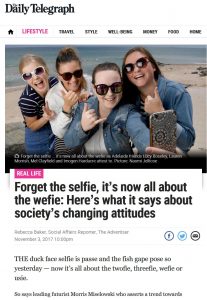Forget the selfie, it’s now all about the wefie / Daily Telegraph, Courier Mail, Perth Now, news.com.au, gearsofbiz.com, Hong Kong Radio 3
I  have long held that society and beauty, alongside everything else about being human, is being forced to reinvent itself to better suit a homocyborg world and despite the doom and gloom of technology being irresponsible it can and does act as force of good, if only humans will use it that way, in this latest series of article in news.com.au, Rebecca Baker and I explored the changing face of globalised beauty and what beauty might mean and look like in a near future society.
have long held that society and beauty, alongside everything else about being human, is being forced to reinvent itself to better suit a homocyborg world and despite the doom and gloom of technology being irresponsible it can and does act as force of good, if only humans will use it that way, in this latest series of article in news.com.au, Rebecca Baker and I explored the changing face of globalised beauty and what beauty might mean and look like in a near future society.
THE duck face selfie is passe and the fish gape pose so yesterday — now it’s all about the twofie, threefie, wefie or usie.
So says leading futurist Morris Miselowski who asserts a trend towards squeezing more people into the camera frame is just one of several signs society is becoming less inward-looking in 2017.
Mr Miselowski says the growing popularity of the group selfie is evidence people are focusing more on their relationships with others and the wider community.
“For much of the past decade we have, as a society, been preoccupied with our own feelings, interests and situation — we’ve become very self-absorbed and narcissistic,” he said.
“The iPhone has allowed us to become self-centred by feeding us a steady diet of me-centric information and clearing the way for us to see the world through our own eyes by giving us news and product information relevant only to us.
“We went through this stage where everyone was taking selfies and sharing what they were eating, where they were having a coffee etc, but people just aren’t as interested in doing that anymore.”
Instead, a more “human-centric” phase is being embraced, the world-renowned strategist says.
“One of the positive things smartphones have done is connect people globally in a way that hasn’t happened in the past … we see there are refugees and we can’t walk away, we see there are people who are starving and we want to help, we see there has been a calamity — a typhoon or whatever — and we want to respond,” he said.
“To me this has been one of the kindest outcomes of social media.”
And he says technology is being rolled out to reflect this.
“We’re now seeing phones being promoted as having wide-angle cameras to take wefies or group shots that’ll fit ‘anyone and everyone in a single click’ … so technology is now being marketed as more of a community, rather than an individual, thing.”
Twenty-year-old Lauren Morrish agrees.
“For me, and my friends, it’s more about sharing memories of good times with good friends, rather than showing off food and stuff,” the third year Flinders University physiotherapy student says.
“I think that sharing a fun time with your friends is really important, especially when you’re at uni and you’re stressed and that’s the kind of picture you want to share on your socials — the fun times that you do have.
“I really think people have just got sick of looking at selfies … newsfeeds are very different now compared to a few years ago, when peace and pout and selfies were all the rage.”
MORE of us are switching off our devices, more often. Mr Miselowski says the idea of a regular digital detox — turning off devices for a period of time, whether that be several hours, a day or a week — is becoming commonplace. This is also being embraced in social settings where, for example, people will put mobile phones in the middle of the table when out to dinner, and the first person’s phone to ring has to shout the meal or drinks.
PLUS size models. The “typical” model of five or 10 years ago is disappearing and model houses are embracing more varied and less generic models. “We’re moving away from a centralised view of beauty — the perfect person — into a space where beauty is becoming more personalised and we’re seeing the world is made up of all sorts of people … magazines are featuring a cross section of models of different sizes, colours, genders and even opinions,” Mr Miselowski says.
FIGHTING back against online bullying. “I think the argument is moving away from technology and back to being human … as a society we are going back to the core of what bullying is and calling it out for what it is. There is a vigilance building in this space I’ve not seen before where it is now becoming culturally abhorrent for children to bully online and that message is being given loud and clear,” Mr Miselowski says.
PARTICIPATION in sport. Mr Miselowski says despite the rhetoric to the contrary, statistically, the rates of children participating in sports in Australia has never been higher.
Phil Whelan Hong Kong Radio 3, 17th October (16 mins 52 secs) extends this conversation into the influence American movies has had and will have on what is considered globally “beautiful”.